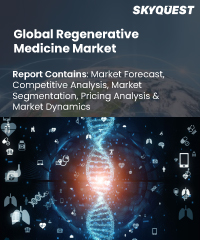
Report ID: SQMIG35I2129

Report ID:
SQMIG35I2129 |
Region:
Global |
Published Date: August, 2024
Pages:
157
|
Tables:
92 |
Figures:
76
Global Regenerative Medicine Market size was valued at USD 9.59 Billion in 2022 poised to grow from USD 12.2 Billion in 2023 to USD 83.6 Billion by 2031, growing at a CAGR of 27.2% in the forecast period (2024-2031).
The multidisciplinary field of regenerative medicine aims to use the body's innate healing powers to replace, regenerate or repair damaged tissues and organs. This is accomplished through tissue regeneration and restoration of normal function using stem cells, tissue engineering, growth factors, and biomaterials. There are many benefits associated with regenerative medicine including its capacity to allow for individualized treatments for various medical conditions like congenital defects, massive injuries, and degenerative disorders. Regenerative medicine holds forth the possibility of better results, less dependency on traditional therapies like organ transplantation, and an improvement in patients' quality of life through encouraging tissue repair and regeneration.
The growth of the burgeoning regenerative medicine industry can be greatly attributed to the escalating demand for personalized treatment. Personalized medicine is an approach in which medical care is tailored for patients’ individual characteristics such as genetic makeup, lifestyle or environment. Regenerative medicines fit well into personalized medicine since both rely on technologies like gene editing and stem cell therapy to achieve individualized treatment. As patients search for treatments that work more efficiently, cause lesser side effects and cater to their personal preferences, regenerative therapies are increasingly in demand. It is also expected that the market will grow faster in the upcoming years due to the expanding use of stem cell technologies, as well as the rising number of product launches and approvals globally.
Our industry expert will work with you to provide you with customized data in a short amount of time.
REQUEST FREE CUSTOMIZATIONWant to customize this report? This report can be personalized according to your needs. Our analysts and industry experts will work directly with you to understand your requirements and provide you with customized data in a short amount of time. We offer $1000 worth of FREE customization at the time of purchase.

Report ID: SQMIG35I2129